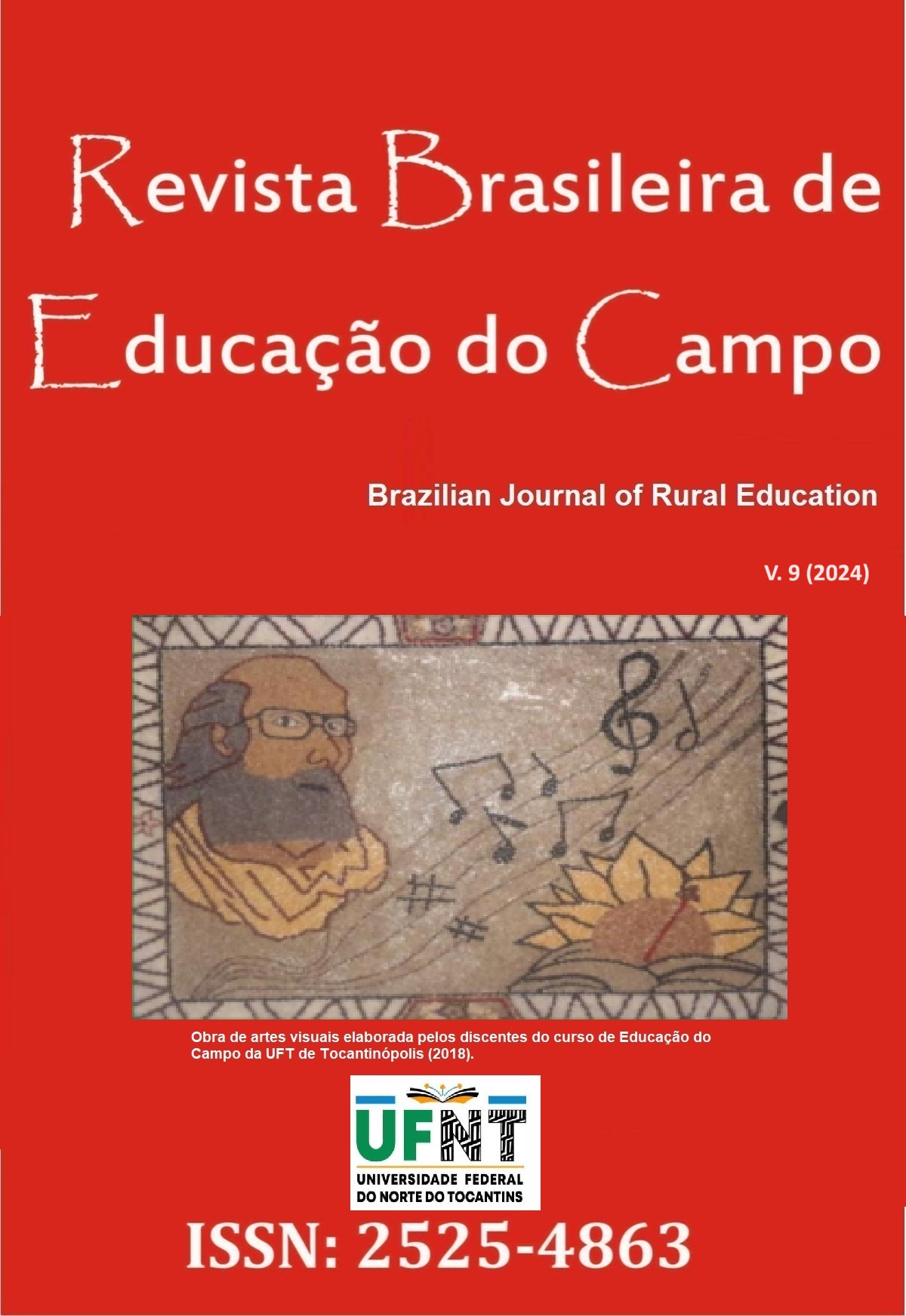Conditions of teaching work during the Covid 19 pandemic
DOI:
https://doi.org/10.70860/ufnt.rbec.e18527Abstract
The text discusses part of the results of the research "Education and Rural Schooling in the times of the Covid-19 pandemic" conducted by groups from the Rede Latino-Americana de escudos e pesquisas em Educação do Campo. Our objective is to analyze the working conditions of teachers in rural schools during the Covid-19 pandemic. We started with data resulting from interviews conducted with questionnaires and answered virtually. Out of the 645 responses we obtained, we selected 18 teachers who work in rural schools in the years 2020 and 2021. We begin the text by discussing labor and the worker, drawing on Marx, in the context of a society guided by the development model of capital. In the second part of the text, we specifically address the working conditions of teachers in rural schools during the Covid-19 pandemic; the analysis is based on the statements of the interviewees, engaging with the elements they brought forward. The precarization of work and the exhaustion of teachers during this period became evident. Finally, we present some considerations about the experiences lived by teachers during the pandemic.
Keywords: teaching work, education, pandemic.
Downloads
Literaturhinweise
Referências
Freitas, L. C. (1992). Em direção a uma política para a formação de professores. Em Aberto, 54.
Frigotto, G. (2003). Educação e crise do capitalismo real. São Paulo: Editora Cortez.
Foster, J. B. (2013). Educação e a crise estrutural do capital: o caso dos Estados Unidos. Florianópolis: Perspectiva, 31(1). DOI: https://doi.org/10.5007/2175-795X.2013v31n1p85
Caldart, R. S., Pereira, I. B., Alentejano, P., & Frigotto, G. (2012). (Org.). Dicionário da educação do campo. Rio de Janeiro: Expressão Popular.
Gadotti, M. (2001). Pedagogia da Terra. São Paulo: Peirópolis.
Janata, N. E. et al. (2020a). Projeto de Pesquisa Educação e escolas do campo em tempos de pandemia do Covid-19. Florianópolis, SC: UFSC.
Janata, N. E. et al. (2020). Questionário online Educação e escolas do campo em tempos de pandemia do Covid-19. In Silva, J. Z., & Verdério, A. (Orgs.). Projeto de Pesquisa Educação e escolas do campo em tempos de pandemia do Covid-19. Amargosa, BA: CFP-UFRB.
Kuenzer A. Z. (1999). As políticas de formação: A constituição da identidade do professor sobrante. Educação & Sociedade, 68. DOI: https://doi.org/10.1590/S0101-73301999000300009
Marx, K. (2003). O Capital: crítica da economia política – Livro 1. 21. ed. Rio de Janeiro: Civilização Brasileira.
Marx, K. (2005). O Capital: crítica da economia política. Rio de Janeiro: Civilização Brasileira.
Mészáros, I. (2011). Para além do capital: rumo a uma teoria da transição. São Paulo: Boitempo.
Mészáros, I. (2005). A educação para além do capital. São Paulo: Boitempo.
Mészarós, I. (2002). Atualidade histórica da ofensiva socialista. In: Para além do capital. São Paulo: Boitempo.
Paniago, M. C. (2000). O controle do capital: uma impossibilidade objetiva. São Paulo: Serviço social e sociedade.
Veiga-Neto, A. (2020). Mais uma Lição: sindemia covídica e educação. Porto Alegre: Educação & Realidade. http://dx.doi.org/10.1590/2175-6236109337 DOI: https://doi.org/10.1590/2175-6236109337
Vendramini, C. (2007). Educação e Trabalho: reflexões em torno dos movimentos sociais do campo. Campinas: Cad. Cedes, 27. DOI: https://doi.org/10.1590/S0101-32622007000200002
Downloads
Veröffentlicht
Zitationsvorschlag
Ausgabe
Rubrik
Lizenz
Copyright (c) 2024 Edson Marcos de Anhaia, Regis Clemente da Costa

Dieses Werk steht unter der Lizenz Creative Commons Namensnennung 4.0 International.
Creative Commons Attribution License
Creative Commons Attribution License
Proposal for Copyright Notice Creative Commons
1. Policy Proposal to Open Access Journals
Authors who publish with this journal agree to the following terms:
A. Authors retain copyright and grant the journal right of first publication with the work simultaneously licensed under the Creative Commons Attribution License that allows sharing the work with recognition of its initial publication in this journal.
B. Authors are able to take on additional contracts separately, non-exclusive distribution of the version of the paper published in this journal (ex .: publish in institutional repository or as a book), with an acknowledgment of its initial publication in this journal.
C. Authors are permitted and encouraged to post their work online (eg .: in institutional repositories or on their website) at any point before or during the editorial process, as it can lead to productive exchanges, as well as increase the impact and the citation of published work (See the Effect of Open Access).














